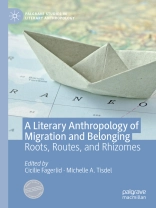This collection pushes migration and ‘the minor’ to the fore of literary anthropology. What happens when authors who thematize their “minority” background articulate notions of belonging, self, and society in literature? The contributors use “interface ethnography” and “fieldwork on foot” to analyze a broad selection of literature and processes of dialogic engagement. The chapters discuss German-speaking Herta Müller’s perpetual minority status in Romania; Bengali-Scottish Bashabi Fraser and the potentiality of poetry; vagrant pastoralism and “heritagization” in Puglia, Italy; the self-representation of European Muslims post 9/11 in Zeshan Shakar’s acclaimed Norwegian novel; the autobiographical narratives of Loveleen Rihel Brenna and the artist collective Queendom in Norway; the “immigrant” as a permanent guest in Spanish-language children’s literature; and Slovenian roots-searching in Argentina. This anthology examines the generative and transformative potentials of storytelling, while illustrating that literary anthropology is well equipped to examine the multiple contexts that literature engages. Chapter 4 of this book is available open access under a CC By 4.0 license at link.springer.com.
Table of Content
1. Introduction: Literary Anthropology, Migration, and Belonging.- 2. Take a Walk on the Shepherd Side: Transhumant Narratives and Representations.- 3. In Search of a Suitable Home or the Perpetual Minority Status: Herta Müller’s Case.- 4. When Author Meets Audience: The Potentiality of Literature to Re-narrate Selves, Belonging, and National Community.- 5. Biography, Descent, and Slovenization: Literature and Slovenian Migrants in Argentina.- 6. Narratives of Competence and Confidence: Self, Society, and Belonging in Norway.- 7. From Bengal to Scotland: Hybridity, Borders and National Narratives.- 8. The Production of the Immigrant as a Perpetual Guest.
About the author
Cicilie Fagerlid was Postdoctoral Fellow at the Department of Library Science at Oslo Metropolitan University, Norway, at the time of writing. Her previous research includes performance poetry on cosmopolitan and working-class Paris and the creation of new ways of being British Asian, both at the Department of Social Anthropology, University of Oslo, Norway, where she has taught extensively. Currently, she writes ethnography from public libraries.
Michelle A. Tisdel holds a doctorate in Social Anthropology from Harvard University, USA. Her research interests include heritage production and discourses of belonging in Norway and Cuba. She conducted long-term research on Cuban museums and Afro-Cuban heritage production. Tisdel works as a research librarian at the National Library of Norway and specializes in migration and heritage themes.











